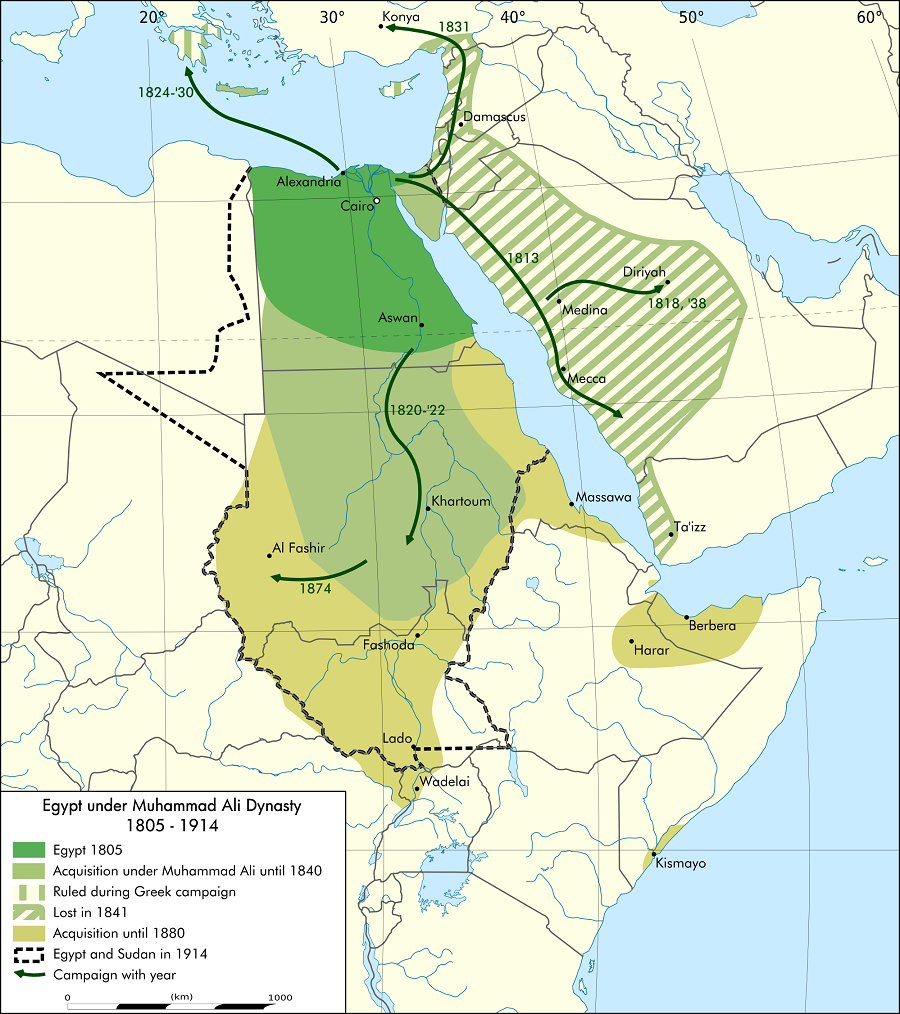Though he at first acted courageously enough, Tewfik’s heart failed him at the critical moment, when he found himself surrounded by armed mutineers.
Continuing Great Britain Expands Control of Egypt,
our selection from History of England by James Franck Bright published in 1893. The selection is presented in seven easy 5 minute installments. For works benefiting from the latest research see the “More information” section at the bottom of these pages.
Previously in Great Britain Expands Control of Egypt.

The capitulations, originally privileges necessary for the safety of foreigners in the presence of a powerful and unscrupulous Government, had become, as the balance of power changed, serious obstacles in the way of administrative reform. The exemption of foreigners from taxation, and the necessity of the cooperation of the consuls in all actions of the police with respect to foreigners, were formidable interferences with the natural rights of an independent nation. It is reasonable to suppose that, in spite of the improvement in their financial situation, in spite of important reforms in the methods of collecting the taxes, and the substitution of ordinary European processes for the violence of unchecked despotism, intelligent Egyptians might feel bitterly the dependence in which they were placed.
The army, like the State, was suffering from outside interference; the higher places were filled by Turks and Circassians; the economical efforts of the Dual Control had driven many officers into enforced retirement. At all events, the military agita tors put themselves forward, and were for the time regarded as the leaders of a national party; but the movement rapidly degenerated, and in the hands of ignorant soldiers became an anarchical attack upon all that was best and most progressive in the country, and finally assumed the form of an intolerant assault upon Christianity in favor of Islam. Early in the year 1881, and again in July, a spirit of insubordination showed itself among the superior officers of the Egyptian army. Various changes in the Ministry were made with a view of satisfying them, but the discontent continued to smolder until, in September, several regiments broke out into open revolt under the leadership of Ahmed Arabi. Arabi was one of the colonels that had been implicated in the earlier disorders, and there seems little doubt that it was the belief that the Khedive and his Ministers continued to cherish a determination to wreak their vengeance on him which drove him and his followers to their violent courses. Though he at first acted courageously enough, Tewfik’s heart failed him at the critical moment, when he found himself surrounded by armed mutineers. He bent to the storm, and dismissed his Minister, Riaz Pacha, from office. With much reluctance Cherif Pacha, the Minister demanded by the insurgents, accepted the vacant place, charging himself with the duty of establishing a constitution and at the same time increasing the army from twelve thousand to eighteen thousand. He insisted, on the other side, upon the withdrawal of the military chiefs from Cairo, and declared his intention of maintaining all international engagements, including the Dual Control. The conditions were fulfilled. The Chamber of Delegates was summoned in December, and Arabi and his confederates withdrew for a while from Cairo. Probably Cherif had looked for the support of the Chamber in assisting him to establish a really national movement. But the assembled delegates not unreasonably regarded as useless a constitution that deprived them of all financial power. They demanded for themselves the right of drawing up the budget. The political agents of the two predominant European Powers considered this a fatal attack upon the Dual Control, to the maintenance of which Cherif was pledged. An ill-judged note, communicated by France and England, raised in the mind of the Egyptians the idea that active interference was contemplated; its effect was the consolidation of the national party and the determination of the delegates to cling to what they regarded as their financial rights. It was in vain that Cherif admitted Arabi himself to his Ministry as Under-Secretary of War; the opposition was too strong for him, and, honorably desirous to maintain the pledge he had given to the Powers, Cherif found it necessary to resign. A ministry in which Arabi held the post of Minister of War was called to office under Mahmud Sami, a man who shared Arabi’s views. The army and the extreme nationalists thus secured a complete triumph.
But the movement had now entered upon a downward course; for there are abundant signs that Arabi was acting with support from Constantinople, while one of the first objects of the real national party had been the exclusion of Turkish influence from Egypt. Nor were proofs wanting of the disastrous results of the military triumph. Anarchy began to spread throughout the country, and the situation of the European and Christian populations became in the last degree precarious.
Such was the state of affairs which the English Government was called upon to face. Its policy with respect to Egypt was of course subjected to its general foreign policy. Its chief objects at this time were the maintenance of the European concert, which was regarded as the best machinery for the settlement of international complications, and within this, and of the first importance, the maintenance of friendship with France. As far, therefore, as Egypt was concerned, it was felt undesirable to act in any way except as the agent of the European Powers, or to thwart the wishes of France if it could possibly be avoided. The joint control, the outcome of a compromise between the interests of France and England, had therefore to be carefully maintained; and during the first months of the new Ministry the two countries had worked hand-in-hand with considerable success. The Arabist movement now threatened to disturb this amicable arrangement. An agitation that could assume with so much plausibility the title of a nationalist movement could not but appeal to the sympathies of the English Liberals; while the French, who were credited (and probably correctly) with less interest in the well being of Egypt than in the advantage of French bondholders, were eager for the suppression of a disturbance that threatened financial prosperity. Though the agents of both Powers on the spot seemed to hope that the quarrel between the Chamber of Delegates and Cherif might be regarded as a purely constitutional struggle, calling for no outside interference, Gambetta, who had lately taken up the reins of office in France, made up his mind that the action of the Chamber was leading to ruin, and that strong measures were necessary to check it.
| <—Previous | Master List | Next—> |
More information here and here, and below.
|
We want to take this site to the next level but we need money to do that. Please contribute directly by signing up at https://www.patreon.com/history

Leave a Reply
You must be logged in to post a comment.